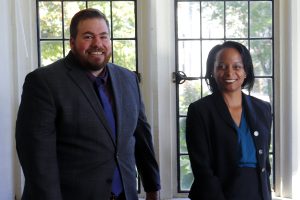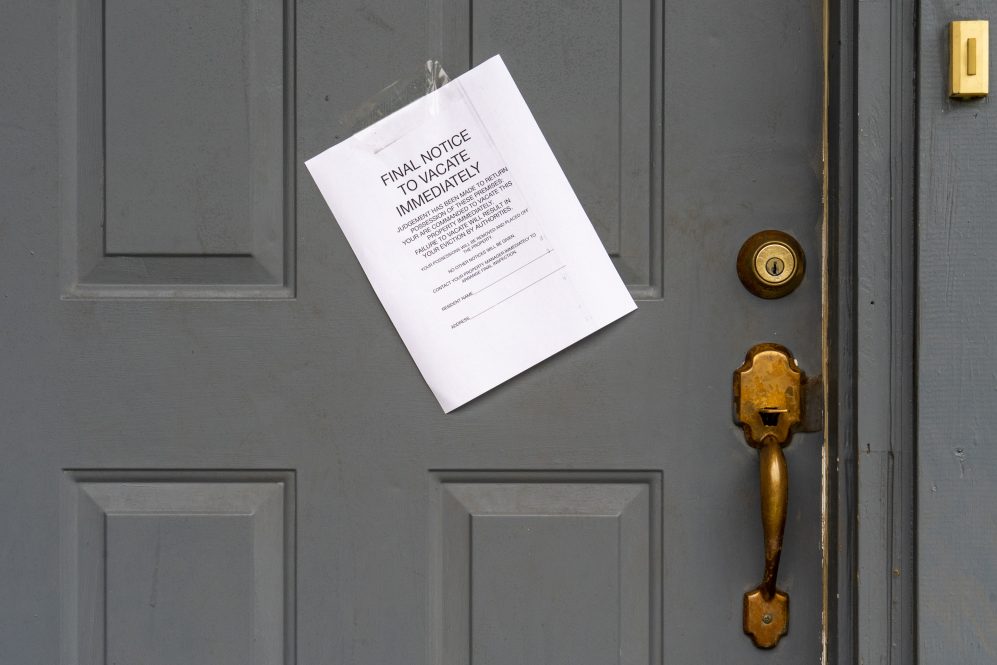A new clinic at the UConn School of Law will assist low-income tenants facing eviction.
The Housing and Eviction Defense Clinic, created with funding from the U.S. Department of Housing and Urban Development and the Connecticut Fair Housing Center, has accepted its first case and enrolled its first cohort of students. Catharine H. Freeman, a visiting professor from Connecticut Legal Services, has joined the UConn Law faculty to direct the clinic. Alex West, formerly Massachusetts supervising attorney for SouthCoast Fair Housing, is the associate director.
“The loss of a home is devastating, often leading to additional detrimental challenges for individuals and families,” Dean Eboni S. Nelson says. “The UConn Law community is honored by the opportunity to address this crisis and grateful to Professors Freeman and West for bringing their talent and experience to this critical mission.”

The clinic will operate under the state’s new Right to Counsel Program, which supports free legal assistance to certain tenants in cases of eviction or loss of a housing subsidy. The Connecticut legislature passed a bill last year to make Connecticut one of three states, with Washington and Maryland, to have a Right to Counsel law. The program is rolling out first in some of the state’s largest cities, including Hartford.
The Connecticut Bar Foundation administers the Right to Counsel program with several partners. The new UConn Law clinic is working in partnership with the Connecticut Fair Housing Center to provide direct services to clients.
There is compelling evidence that legal representation has a powerful effect on the outcome of eviction cases. A study by the Connecticut Fair Housing Center and the Connecticut Data Collaborative found that landlords had a lawyer in 80 percent of Connecticut eviction cases, while tenants had a lawyer in only 7 percent of cases. Twenty-four percent of renters with lawyers ultimately faced removal orders, compared with 45 percent of those without.
The study also found substantial and systemic racial disparities, with Black renters three times more likely and Latinx renters more than twice as likely as white renters to face eviction. White tenants are 37 percent more likely to have a lawyer. Women in Connecticut and across the nation, especially Black and Latina women, face eviction at a disproportionate rate.
“The reality of evictions in Connecticut is that they are a consequence of intentionally discriminatory historical policies that limited housing choice for households of color and marginalized low-income households,” says Greg Kirschner, legal director of the Connecticut Fair Housing Center. “Evictions and the resulting displacement cement the effects of these policies by promoting segregation and undermining economic and social opportunity.”
The clinic’s goal is not only to assist tenants but to train law students and build a pipeline of lawyers prepared to practice housing law in the long term.
“We want to see more law students graduate with legal training in housing law,” Freeman says. “Ideally, they will go on to practice housing law as a career choice or meet their pro bono commitments in housing.”
West said the Right to Counsel movement holds great promise as it expands in Connecticut, and potentially across the nation. “We are just beginning to attempt to level the playing field in eviction and other matters of civil litigation, where those with the fewest resources have long been at an unfair disadvantage,” he says.
The Housing and Eviction Defense Clinic is one of six in-house clinics operated by UConn Law faculty to serve the community while training law students. The law school also offers six clinics in partnership with affiliated organizations, including a Disability Rights Clinic that opened in this fall in a collaboration with Disability Rights Connecticut.
“This is an exciting time for experiential education at UConn Law,” says Jessica Rubin, associate dean for experiential education. “Our new clinics are providing legal help to underserved communities and individuals while expanding the opportunities we offer our students to engage in legal work. The results are practice-ready graduates and greater access to justice for those who need it most.”
More information about Connecticut’s Right to Counsel program, including eligibility criteria, is available from Eviction Help CT.



